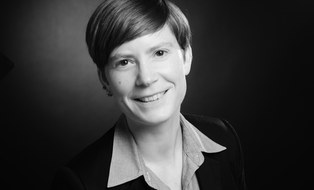Dr. Mareike Braeckevelt
 © MB
© MB
Wissenschaftliche Projektmanagerin
NameDr. Mareike Braeckevelt
Koordination CAWR
Institute of Urban and Industrial Water Management
Visitor address:
Chemie-Bau, Room 162 Bergstraße 66
01069 Dresden
Office hours:
Please arrange an appointment via email.
| 2000 bis 2006 | Studium der Chemie/Umweltchemie, Universität Leipzig |
| 2005 bis 2006 | Diplomarbeit: Investigations on the biological transformation of chlorinated benzenes in a pilot-scale constructed wetland |
| 2006 bis 2011 |
Dissertation am Helmholtz-Zentrum für Umweltforschung – UFZ: Constructed wetland treatment of groundwater contaminated by chlorinated volatile organic compounds Promotionsstipendium der Deutschen Bundesstiftung Umwelt |
| 2004 | Physical & Theoretical Chemistry Laboratory, University of Oxford, UK: Modellierung der atmosphärischen Photochemie anthropogener ungesättigter Alkohole und Ether |
| 2004 |
Leibniz-Institut für Troposphärenforschung Leipzig: Kinetik atmosphärischer Reaktionen von a-Hydroxycarbonsäuren mit SO4- - Radikalen |
| 2004 | Umweltforschungszentrum Leipzig-Halle – UFZ: Fermentative Produktion von 2-Oxocarbonsäuren aus Pflanzenölen |
| 2008 |
US Geological Survey MD-DE-DC Water Science Center, Baltimore, USA: Biotische und abiotische reduktive Dechlorierung von chlorierten Lösungsmitteln in kontaminierten Feuchtgebiets- und Aquifersedimenten |
| 2009 und 2013 |
Universidad Tecnológica de Pereira UTP, Kolumbien: Wissenstransfer bezüglich des Einsatzes von Pflanzenklärsystemen zur Abwasserbehandlung im Rahmen des DAAD-Projektes PROCOL |
| 2006 | Wissenschaftliche Mitarbeiterin am Umweltforschungszentrum Leipzig-Halle - UFZ, AG Ecological Wastewater Treatment Technologies |
| 2010 bis 2012 | Wissenschaftliche Projektkoordinatorin im EU-Projekt ModelPROBE (Modellgesteuerte Altlastenerkundung und -bewertung) |
| 2012 | Wissenschaftliche Mitarbeiterin am UFZ: Auswertung von Fettsäure- und Aminosäureprofilen von Böden |
| 2013 bis 2015 | Wissenschaftliche Mitarbeiterin im EU-Indien-Projekt Water4Crops (Abwasserhygienisierung in biologischen Klärsystemen zur Wiederverwertung in der Landwirtschaft) |
| seit 2015 | Wissenschaftliche Koordinatorin des Center for Advanced Water Research CAWR an der TU Dresden |
Braeckevelt, M., Rokadia, H., Imfeld, G., Stelzer, N., Paschke, H., Kuschk, P., Kästner, M., Richnow, H. H., Weber, S. (2007). Assessment of in situ biodegradation of monochlorobenzene in contaminated groundwater treated in a constructed wetland. Environmental Pollution 148: 428-437.
Braeckevelt, M., Rokadia, H., Mirschel, G., Weber, S., Imfeld, G., Stelzer, N., Kuschk, P., Kästner, M., Richnow, H.-H. (2007). Biodegradation of chlorobenzene in a constructed wetland treating contaminated groundwater. Water Science & Technology 56(3): 57-62.
Braeckevelt, M., Mirschel, G., Wiessner, A., Rueckert, M., Reiche, N., Vogt, C., Schultz, A., Paschke, H., Kuschk, P., Kaestner, M. (2008). Treatment of chlorobenzene contaminated groundwater in a pilot-scale constructed wetland. Ecological Engineering 33: 45–53.
Pfrang, C., King, M.D., Braeckevelt, M., Canosa-Mas, C.E., Wayne, R.P. (2008). Gas-phase rate coefficients for reactions of NO3, OH, O3 and O(3P) with unsaturated alcohols and ethers: Correlations and structure–activity relations (SARs). Atmospheric Environment 42: 3018–3034.
Imfeld, G., Braeckevelt, M., Kuschk, P., Richnow, H.-H. (2009). Review: Monitoring and assessing processes of organic chemicals removal in constructed wetlands. Chemosphere 74: 349–362.
Braeckevelt, M., Seeger, E.M., Paschke, H., Kuschk, P., Kaestner, M. (2011). Adaptation of a constructed wetland to simultaneous treatment of monochlorobenzene and perchloroethene. International Journal of Phytoremediation 13: 998–1013.
Braeckevelt, M., Reiche, N., Trapp, S., Wiessner, A., Paschke, H., Kuschk, P., Kaestner, M. (2011). Chlorobenzenes removal efficiencies and removal processes in a pilot scale constructed wetland treating contaminated groundwater. Ecological Engineering 37: 903–913.
Braeckevelt, M., Kaestner, M., Kuschk, P. (2011). Removal of monochlorobenzene and perchloroethene in wetland rhizosphere model systems. Engineering in Life Sciences 11: 298-308.
Wu, S., Chen, Z., Braeckevelt, M.U., Seeger, E.M., Dong, R., Kästner, M., Paschke, H., Hahn, A., Kayser, G., Kuschk, P. (2012). Dynamics of Fe(II), sulphur and phosphate in pilot scale constructed wetlands treating a sulphate-rich chlorinated hydrocarbon contaminated groundwater. Water Research 46: 1923-1932.
Chen, Z., Wu, S., Braeckevelt, M., Paschke, H., Kästner, M., Köser, H., Kuschk, P. (2012). Effect of vegetation in pilot-scale horizontal subsurface flow constructed wetlands treating sulphate rich groundwater contaminated with a low and high chlorinated hydrocarbon. Chemosphere 89, 724-731.
Kästner, M., Braeckevelt, M., Döberl, G., Cassiani, G., Petrangeli Papini, M., Leven-Pfister, C., van Ree, D. (Eds.) (2012). Model-driven soil probing, site assessment and evaluation - Guidance on Technologies. Sapienza Università Editrice, Rome, Italy.
Braeckevelt, M.U., Fischer, A., Kästner, M. (2012). Mini-Review: Field applicability of Compound-Specific Isotope Analysis (CSIA) for characterization and quantification of in situ degradation in contaminated aquifers. Applied Microbiology and Biotechnology 94: 1401-1421.
Wu, S., Wiessner, A., Braeckevelt, M., Kappelmeyer, U., Dong, R., Müller, J. A., Kuschk, P. (2013). Influence of nitrate load on sulfur transformations in the rhizosphere of Juncus effusus in laboratory-scale constructed wetlands treating artificial domestic wastewater. Environmental Engineering and Management Journal 12(3): 565-573.
Seeger, E. M., Braeckevelt, M., Reiche, N., Müller, J. A., Kästner, M. (2016). Removal of pathogen indicators from secondary effluent using slow sand filtration: Optimization approaches. Ecological Engineering 95: 635–644.
